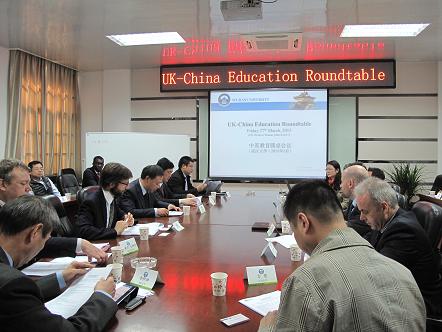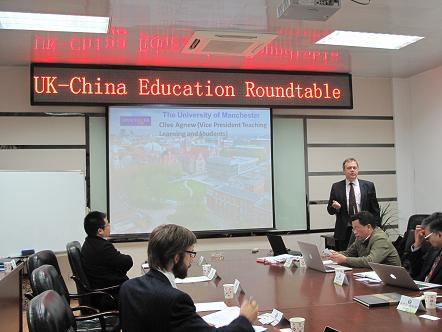On March 27th, a UK-China Education Roundtable was held successfully at Wuhan University, Vice President Li Fei and both Chinese and British experts discussed the latest research dynamics on Smart Green City planning and the prospect of collaboration between Wuhan and Manchester in this field.
Vice President Li Fei first received the UK delegation, briefly introducing the beautiful campus environment of Wuhan University, along with its long history and profound culture. Then he identified in detail the outstanding achievements in scientific research and expressed his heartfelt hope for further cooperation between Wuhan University and prestigious overseas universities such as the University of Manchester. On behalf of the UK delegation, Orlando Edwards, the Cultural and Education consul of British Council, expressed his gratitude to the hospitality shown by Wuhan University, especially at the time of the official opening of the British Consulate General in Wuhan. He believes that as sister cities, Wuhan and Manchester have a lot in common and can learn from each other. He hopes that there will be more exchange activities in the future, in order to promote friendship and cooperation.

At the Roundtable session held in the school of information management, Vice President of University of Manchester Prof. Clive Agnew, Vice President of the University of Salford Prof Nigel Mellors, Professor Elias Siores of The University of Bolton. Professor Chen Nengcheng of Wuhan University , professor Li Xiangkun of Hubei University, Professor Fang Yong of Jianghan University, Professor Zhou Haiying of Hubei Automotive Industry University, Professor Zhang Xiaolong of Wuhan University of Science and Technology and Professor Gong Jian of Huazhong Normal University explored the possibilities of building a Smart Green City from the perspectives of information and the earth space, sustainable development, Smart Campus, Smart City ICT industrialization of Smart Cities, energy research and tourism. After the meeting, experts from both countries also conducted talks on ways to deepen the cooperation on specific topics. “Smart City planning is not a task that any single university and institution can accomplish independently; the Chinese and British governments need to promote cooperation and channel personnel training in this area,” commented Professor Clive Agnew.
Professor Elias Siores had a special relationship with Wuhan—he had visited the city and Wuhan University twenty years ago when he took part in a collaborative research project on Plastics Injection Molding. “Back then we worked with four top-ranked universities in China, including Wuhan University. It’s really nice to be back now, especially at the time when your campus is most breathtaking in the entire year.” remarked Professor Siores. At the roundtable, Professor Siores brought with him the latest trends on energy research at University of Bolton, proposing a novel approach towards building Smart Cities—the R&D of flexible energy materials. He and his team believe that such materials can have multiple applications including the intelligent tire, synthetic trees, energy-collecting sails of yachts and power-generating cushions, all of which are conducive to the ultimate implementation of energy efficient Smart Cities.

The UK-China education Roundtable is one of the important sections of the "Wuhan British Week" and is held under the initiative of the UK-China Smart Green Cities project. The Planning and Governance project was a joint initiative funded by UK Foreign and Commonwealth Office’s China Prosperity Strategic Program Fund (SPF) and involved a number of UK and Chinese partners. Led by the city of Manchester, it includes the cities of Bristol, Wuhan, Tianjin, Xuzhou and Qingdao as well as Digital China. By taking the lead from the EU China Smart Cities Forum, the project will help to bring “smart city policy” outputs, which when implemented, will in turn require further collaboration for assistance in implementation. The outputs linked to networking events will lead to the creation of longer term relationships between UK companies, Chinese cities and their business partners. The activities will form the basis for long-term collaborations, consolidating the relationships between the UK and the Chinese participants and opening up business opportunities.
(Edited by Diana & Sijia Hu)